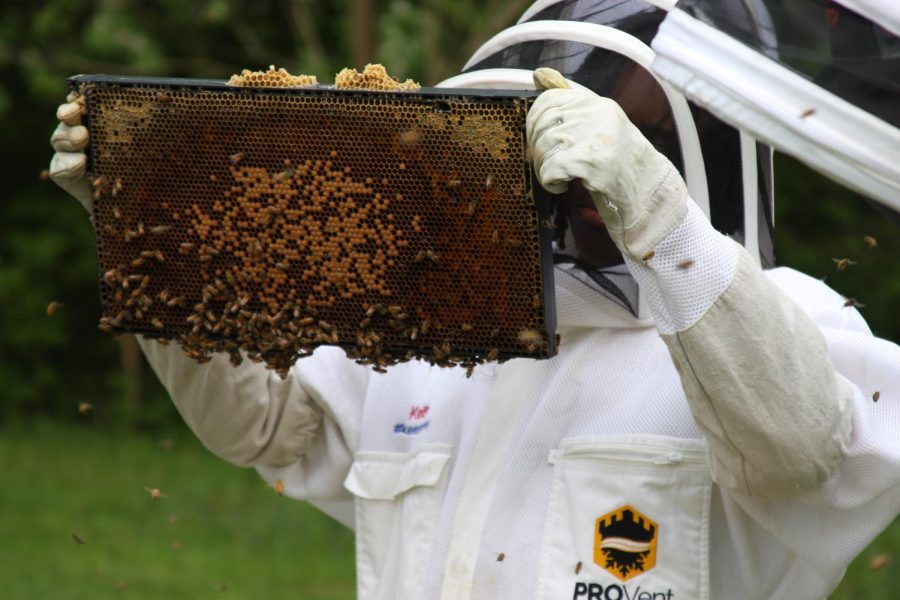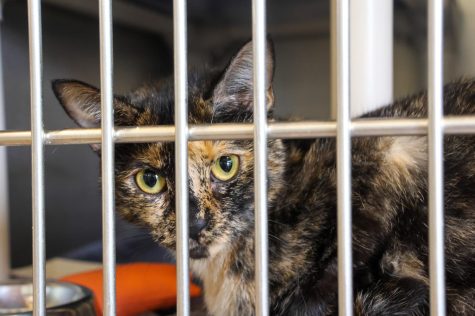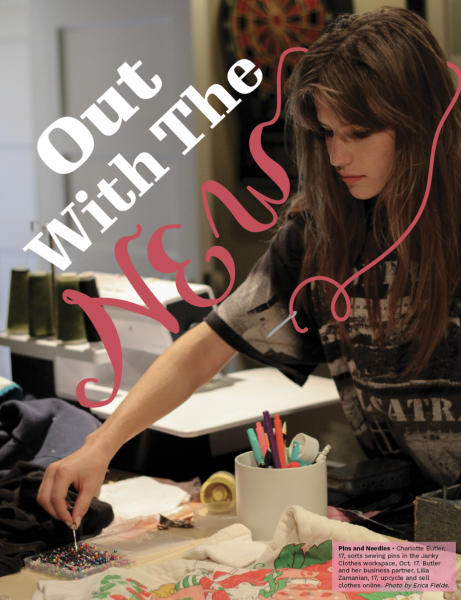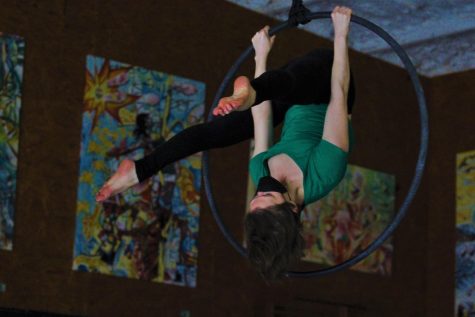All the Buzz
What’s the buzz? Well, when someone takes off with their passion and uses it to transform their life into something extraordinary, it’s bound to draw attention.
Photos by Jackson Barnes
Queen Bee – On May 3, Keith Griffith III, 15, inspects a bustling wax comb during a hive installation at a farming ground in Middletown. He looked for a queen, as finding and isolating the queen is a crucial part of putting new bees in a hive. Photo by Jackson Barnes.
It starts out quiet at first, with simple ingredients and simple beginnings. For Keith Griffith III, a young beekeeper living in the West End of Louisville, it all started back when his uncle introduced him to beekeeping as a hobby when Griffith was just 11 years old. As Griffith was about to leave for basketball practice, his uncle asked for help installing a new hive. In his first encounter with the bees, he only had his uncle’s borrowed bee jacket to wear as protection, since his uncle typically used that jacket and operated his own hives all while paralyzed from the waist down.
“I wasn’t safe at all. I mean, I was pretty safe from the waist up,” Griffith said.
Before long, Griffith was assisting his uncle in running the hives and looking to acquire some hives of his own. From there, Griffith fell in love with beekeeping and wanted to turn it into something more. In 2019, he founded his company, Beeing2gether. He started off small, doing business with friends and family before growing into inperson orders. But a little bit of attention brought from the local press blossomed Beeing2gether into much more.
“Literally one message changed how our business was run,” Griffith said. After being contacted for an interview with WHAS11 in 2020, the company gathered enough buzz from the community that they were able to expand and ship their honey and other bee products across the Louisville community. Their first run was so successful that they had to go on break temporarily. The business continued to grow from there, building their line of products, gaining acclaim from local media and fans, and even renting out hives and helping others make honey in their own backyards.
Fast forward to today, Griffith is a 15-year-old beekeeper, entrepreneur, and author in Louisville. Griffith mainly works on his business in the spring and summer, bouncing between different hives owned by friends, family, and rentiers. He’s mastered multiple tools of the trade, such as burlap smokers for calming bees during intensive operations and a hive tool, or scraper, used to remove excess wax as well as to separate, remove, and lift the frames of a hive. He is consistently calm and laid-back in the eye of a buzzing storm, a bee whisperer consistently aiding in both hive installations and honey extractions for everyone from hobbyist beekeepers, gardeners, and full-time farmers all across the greater Louisville area.
Of course, he’s been noticed for all of this hard work. He has won a multitude of national awards, including the first-place Bayer Blue Ribbon Beekeeper Award in 2020, two 2021 Kurt Giessler Foundation Grants for Ambition and Achievement, as well as a full ride to Trinity High School from an anonymous donor. Although both his parents have been incarcerated, his family has been an extremely supportive and integral part of Griffith creating and managing his young business. Now, Beeing2gether’s honey is sold at multiple Rainbow Blossoms, Blue Dog Bakery, Black Soil market in Lexington, and most recently in some local ValuMarket locations, in addition to multiple local farmers’ markets. Griffith’s book, “Honey Bees & Beekeeping: A Mental Health Miracle,” is about sharing his experience with beekeeping as a hobby and a burgeoning business, and explaining the basic steps and vocabulary of beekeeping. He aims to break down the barrier around mental health by discussing how important healthy hobbies are for keeping your brain healthy too.
While Griffith enjoys spending time with the multiple apiaries he has around Louisville, he also loves to play video games, as well as football and basketball, with aspirations to be a mainstay on both Trinity teams. This means that since his weekdays are occupied by full days of high school, long practices, along with strength and conditioning, his time for beekeeping and hive maintenance outside of peak summer months is largely reserved for the weekends.
“In a week, I would say he probably spends about three hours beekeeping without harvesting. But with harvesting, it’ll take between about seven to eight hours,” said Stephanie Dukes, Griffith’s mother.
All of this hard work has drawn the attention of his peers at school, too, beyond the aforementioned accolades.
“There’s one dude, sometimes at lunch he’ll walk up to me and give me a fist bump — ‘I’m like your number one customer here, I’ve bought the most honey.’ I’ve got like two teachers that have bought it already too, and my P.E. coach wants to get some,” Griffith said.
Even beyond the classroom and his neighborhood, Griffith is making an impact on communities and environments all across Louisville. For example, Christopher Manzo is an architect and educator living off of Frankfort Avenue in Louisville who rents a hive from Griffith and his Beeing2gether company.
“Last year, I had a buddy of mine, another architect, and he had bees, and that felt like a really great thing to pair up with the gardening I was already doing. My wife had seen a Facebook post about Keith and his project, so I just messaged them and said, ‘Hey, I’m thinking about getting some bees, what do you all know and what can you do?’ and they said, ‘We’ll get you all set up,’” Manzo said.
Manzo’s hive is constructed in the same way as the many hives that Griffith keeps at his multiple locations; Griffith currently maintains about 10 different hives in the backyards and homes of his friends and family, such as his grandmother and great-grandmother’s house. There’s the bottom board, which provides the entrance and exit for all the bees in the beginning section of the hive. Then, there’s the hive body or the deep super. This box sits above the bottom board and serves as the living quarters for the bee colony, and the frames or sections within this part of the hive are filled with tiny bee eggs, in addition to the first foundational layers of honeycomb and pollen. Lastly, the most crucial parts of the hive for the extraction process are the aptly named honey supers. These are smaller boxes and collections of frames that the hive expands into once it is healthy and well-built, where the excess honey can be easily harvested and sent off to Manzo’s family and friends, as well as in Griffith’s case, Beeing2gether’s customers.
After Manzo’s first year with the hive that he rented from Beeing2gether, he was able to extract over five pounds of honey from only two frames. This upcoming year, Manzo expects to get much more than that amount, and thus much more than he’d be able to eat, plenty to send off to friends and family as hit holiday gifts as he did with last harvest, or even to potentially sell at farmers’ markets that Griffith already has connections to.
But Manzo isn’t just harvesting honey. Honeybees are also an important pollinator for not just ecosystems all across the United States, but our local neighborhoods where hobbyist beekeepers often operate.
“They have up to a two mile radius I believe, where they harvest from and where they pollinate, so I think of it as a neighborhood thing,” Manzo said. “We’ve got a children’s home over here a couple blocks away with a huge field of clover, we have hawks and foxes and all sorts of wildlife.”
Manzo himself uses the bees to help pollinate and foster a diverse environment of crops in his backyard, growing a variety of herbs, vegetables, and greens for himself, and inspiring healthy eating for his entire family, all with the added plus of staying in touch with nature.
“It’s really turned into a sanity thing too, getting out here and messing around in the garden. It really is a good mental health break from the workaday world. You know, developing a respect for the bees, and nurturing them, and letting them nurture us back with their honey and their presence,” Manzo said.
Of course, there are many challenges to running such a beekeeping business. The first one you might think of, obviously, is avoiding stings.
“It doesn’t happen a lot. But I’ve been stung seven times through my gloves in one beekeeping session,” Griffith said.
“Typically, with getting stung, it’s because we went back again and we shouldn’t have done that. We were just trying to get the job done. Typically, when you go into a hive, you don’t want to upset them too many times in a day,” Dukes added.
Additionally, as Griffith explained in detail, honeybees have a multitude of predators and parasites that constantly threaten to take over hives if they aren’t properly maintained, especially in the winter.
“Varroa mites can start a virus inside the hive. They can fall off a bee and into the cells where a queen will lay an egg, and it can make that newborn get sick, die, and go throughout the hive,” Griffith said.
Wax moths are another pest identified by Griffith and other beekeepers as problematic to honeybee hives, feeding off of beeswax and bee remains and potentially taking over weaker hives.
“When you lose a hive, it slows down the process of producing more honey and it makes stuff harder. You learn from the mistakes,” Griffith explained.
Another challenge to running his business is keeping up with increasing demand, while helping manage the company’s social media and maintain its momentum. Dukes helps him manage this social media presence as well as much of the day-to-day logistics of running a business. “Social media is definitely a big influence on a business.
With ours, he started out so young, so he wasn’t really good with Facebook and Instagram. I had to start his business up on Instagram,” Dukes said. “Then he just made mental health posts, bee facts, and stuff like that. And shoot, it went bonkers, you know?”
There are many ways and many reasons to support local beekeepers and other local youthled businesses like Beeing2gether. Their website, beeing2gether.com, hosts their store as well as their blog with updates on the company and Griffith’s beekeeping career. Presently, they sell raw honey, handmade soap, lip balm, Griffith’s book, and other merchandise, and their product line expands each season. Additionally, their Facebook, Twitter, and Instagram accounts are all good places to follow for updates on Griffith and his company.
While the science is somewhat conflicting, buying local honey with its trace amounts of local pollen is also commonly considered an effective way to reduce the symptoms of mild seasonal allergies. According to Griffith, his own teachers at school who were purchasing his honey products not only reported that it helped their allergies, but Griffith stated that he used to take a teaspoon of honey every night for the same purpose as well. All of these benefits work in conjunction with supporting local environments, pollinators, and youth entrepreneurs when buying from a local student business like Beeing2gether.
Griffith’s future remains up in the air, but both he and his mother are confident that Griffith and his company will continue to grow their aspirations together. Dukes plans to have her son go to college for two years for Business Administration. Griffith isn’t sure that he will follow that track, but mainly stresses that no matter what, he aspires to continue his Beeing2gether company for the benefit of both his community and his family far beyond high school. After all, that’s what beeing together is all about. •
Donations are collected through The Publishers, duPont Manual High School's booster club for J&C. On The Record relies completely on sponsorships, advertisements, and donations to produce and distribute each issue. Please consider donating to our cause, and helping the student journalists of OTR amplify youth voices for years to come.

Jackson Barnes is a senior Multimedia Assignment Editor for On the Record. He loves music, both listening to and creating it. He has a passion for photography,...


















